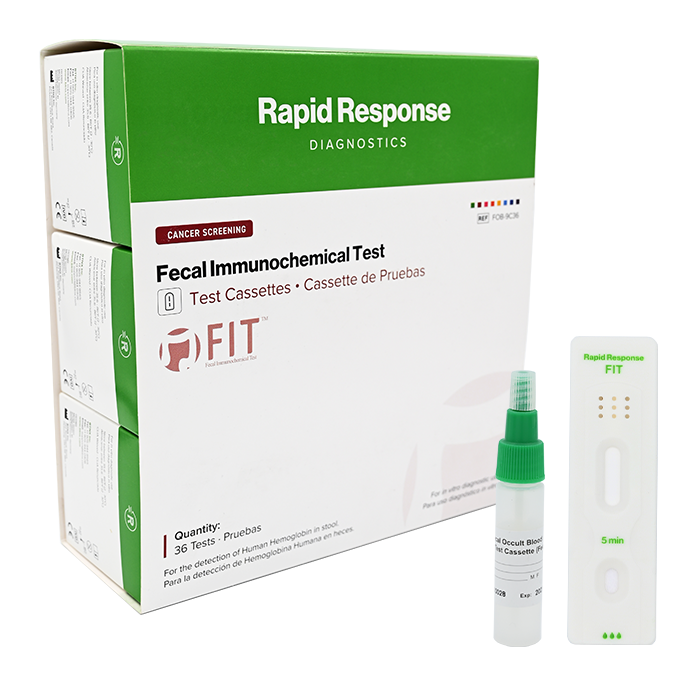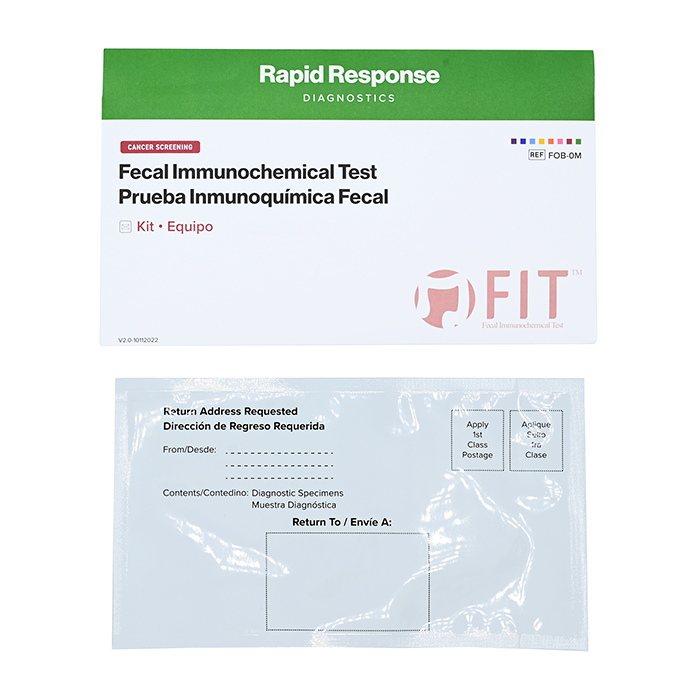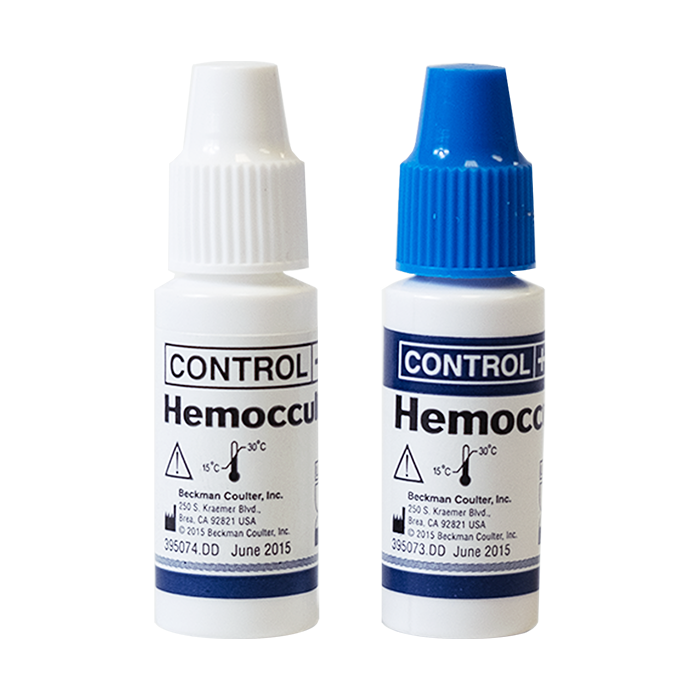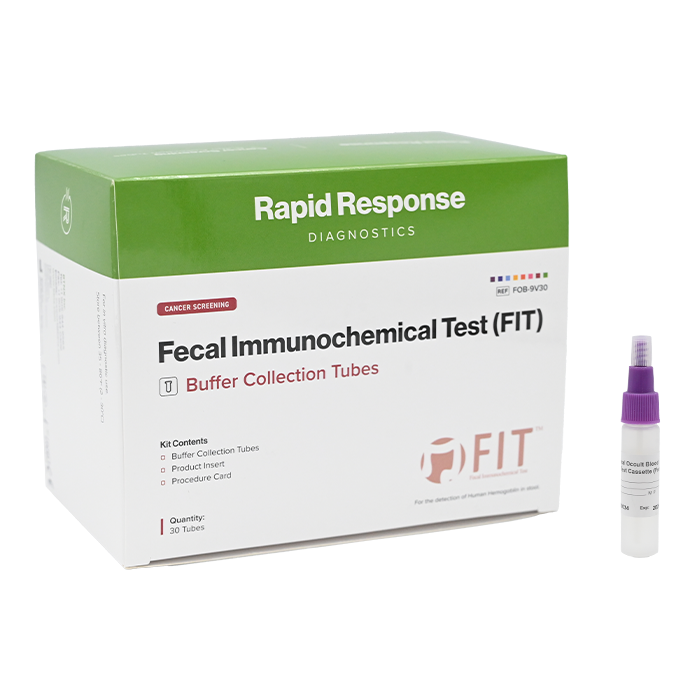
The Rapid Response® Fecal Immunochemical Test (FIT) is an immunochromatographic assay intended for the determination of human hemoglobin in feces by professional laboratories or physician’s offices. It is useful to determine gastrointestinal bleeding found in a number of gastrointestinal disorders such as colorectal carcinoma, colon polyps, diverticulitis and ulcerative colitis.

Format: Cassette
Kit Size: 2 Tests/Kit

Format: Cassette
Kit Size: 36 Tests / Kit

Format: Card
Kit Size: 50 Mailers / Kit

Kit Size: 1 Pair / Kit

Kit Size: 30 Tubes / Kit
Find the best solution for your needs
Our sales representatives can help set you up for success! Contact our team today!
Introduction to Cancer Screening
Getting tested for cancer before any symptoms appear can significantly improve health outcomes. Cancer screening test kits detect early signs of disease when it’s most treatable. This category focuses on colorectal cancer—also known as bowel cancer—and provides a clear overview of what it is, who’s at risk, and how screening can help.
What is Colorectal Cancer?
Colorectal cancer starts when cells in the colon or rectum begin to grow uncontrolled. These changes often begin as polyps—small clumps of cells that form on the colon or rectum’s lining. Some polyps remain harmless, but others can develop into cancer over time.
Catching these polyps early through pre-cancer tests is one of the most effective ways to prevent the disease from progressing. Using tools like a bowel cancer test kit order online, people can monitor their health without waiting for symptoms to appear.
What are the Symptoms?
Although early colorectal cancer often has no symptoms, changes in your body may eventually become noticeable. These include:
-
Changes in bowel habits, such as frequent toilet trips or difficulty passing stool.
-
Blood in or on your stool.
-
Diarrhea, constipation, or the feeling that your bowel hasn’t completely emptied.
-
Ongoing stomach discomfort, including pain, cramping, or bloating.
-
Unexplained weight loss.
These symptoms can also point to other conditions, so it’s important not to panic. Still, if you experience any of them, it’s time to speak with your doctor and consider using a cancer screening test kit to investigate further.
Source: National Center for Chronic Disease Prevention and Health Promotion; Division of Cancer Prevention and Control
What Are the Risk Factors?
Colorectal cancer risk increases with age, especially after 45. But it’s not only about age—there are several lifestyle and genetic factors involved:
-
Chronic conditions like inflammatory bowel disease.
-
A personal or family history of colorectal cancer.
-
Certain inherited genetic syndromes.
-
Diets low in fruits and vegetables or high in processed meats and fats.
-
Lack of regular physical activity.
-
Being overweight or obese.
-
Smoking and alcohol use.
Reducing these risks starts with awareness. Regular screening using at-home cancer screening kit options makes it easier to stay informed and take action early.
What Can I Do to Reduce My Risk?
Screening = Prevention
This simple equation matters. Early testing allows doctors to find and remove precancerous polyps before they become cancerous. The American Cancer Society advises that people at average risk begin routine screenings at age 45. That’s not just a recommendation—it’s a practical step backed by data.
Fit kit testing is one easy and widely used option. It’s non-invasive and can be done from home. The process helps detect hidden signs of cancer long before physical symptoms start.
What Should I Know About Screening?
A screening test checks for disease in people who don’t show signs yet. That’s why it’s different from diagnostic testing. Using a cancer screening test kit at regular intervals means problems can be caught early when treatments are more effective and less complex.
Some screening tests look for signs in the stool, while others provide a visual check of the colon. The right test depends on age, health history, and comfort level.
Screening = Early Detection = More Options
What Are the Test Options for Colorectal Cancer Screening?
There are two main types of colorectal cancer screening: stool-based tests and visual exams.
Stool-based tests:
These tests are completed at home. They check for blood or DNA changes in stool that might indicate the presence of cancer or polyps. They’re simple, noninvasive, and don’t require a hospital visit. However, they must be repeated regularly, and a positive result means follow-up testing is needed.
Common stool-based options include:
-
Guaiac-based fecal occult blood test (gFOBT)
-
Fecal Immunochemical Test (FIT)
-
FIT-DNA test
You can now bowel cancer test kit order online, making regular screening more accessible than ever.
Visual (structural) exams:
These tests examine the inside of the colon and rectum using scopes or imaging. They’re done less frequently but require preparation and are more involved.
Options include:
-
Colonoscopy
-
CT colonography (virtual colonoscopy)
-
Sigmoidoscopy
Each method has its place. If a stool test, like fit kit testing, shows abnormal results, a colonoscopy is usually the next step to determine what’s happening.
Source: Colorectal Cancer Screening Tests | Sigmoidoscopy & Colonoscopy | American Cancer Society
How Do FIT Tests Work?
The FIT (Fecal Immunochemical Test) screens for hidden blood in the stool, which may be a sign of cancer or large polyps. It’s one of the most popular at-home cancer screening kits because it’s quick, affordable, and doesn’t require dietary changes before testing.
You simply use the kit to collect a small sample of stool and return it for lab analysis. If blood is detected, your provider will recommend further testing—typically a colonoscopy. The process is straightforward and can be done annually for ongoing monitoring.
About the Results and Interpreting Results
FIT test results are easy to understand:
-
Positive: Two red lines appear (one in the control and one in the test regions). This means further testing is needed.
-
Negative: One red line in the control region, and no line in the test region. No blood was detected.
-
Invalid: No line appears, or only the test line shows. This means the test didn’t work and needs to be repeated.
If your result is positive or invalid, contact your healthcare provider. They will guide you through the next steps, which may involve a more detailed visual exam.
Polyps are mushroom-like growths that form when cells lining the colon grow abnormally. They can become cancerous over time.
According to the WHO, colorectal cancer is the third most common cancer in the United States.
According to the Canadian Cancer Society, colorectal cancer is the 4th most common cancer in Canada.
See your doctor for yearly screenings if you are aged 45 or older. The American Cancer Society recommends to consider starting to screen at age 45.
Guaiac-based Fecal Occult Blood Test (gFOBT) – This test detects occult (hidden) blood in the stool through a chemical reaction. It is done once a year. Stool sample is collected and then return the kit to the doctor or lab. Food and medication can affect the results of this test.
Fecal Immunochemical Test (FIT) – This test is an effective tool for colorectal cancer screening and for symptomatic assessments. This test detects occult (hidden) blood in the stool by using antibodies. It is done once a year. The test can be visually interpreted. These tests have greater clinical and analytical sensitivity.1,2 Unlike guaiac-based FOB tests (gFOBT), they have no dietary or medication restrictions prior to testing.
- Fraser CG et al. Newer Fecal Tests: Opportunities for Professionals in Laboratory Medicine. Clin Chem. 2012;58(6):963−5.
- Halloran, SP et al. European guidelines for quality assurance in colorectal cancer screening and diagnosis. First Edition. Faecal occult blood testing. Endoscopy. 2012;44:1−23.
Talk to your healthcare provider to discuss if you are eligible for a FIT test.
It is recommended that people at average risk get screened with the fecal immunochemical test (FIT) every 2 years. (Cancer Care Ontario)
The American Cancer Society recommends regular screening starting at age 45. It is recommended to take a FIT test every year.
Which test to use depends on your preferences, medical condition, personal or family history, genetic syndrome, and available resources. Talk to your doctor about which test to use. (Centers for Disease Control and Prevention)
